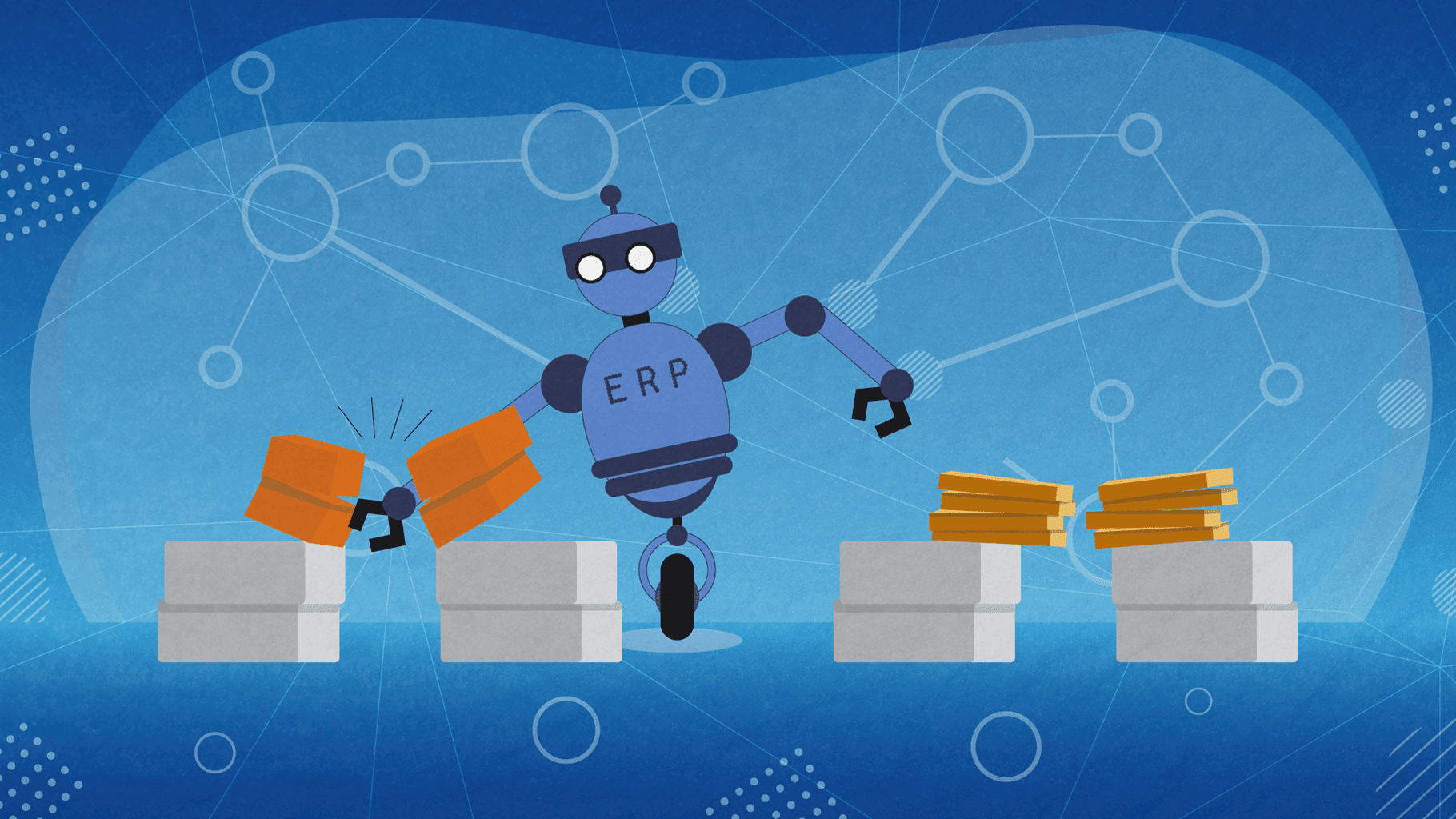5 Types of Enterprise Software and Why They’re Worth the Investment

Enterprise-level companies need to invest additional efforts into optimizing their internal operations to stay competitive. They do so by saving time where possible, centralizing knowledge, automating tasks, and strategically implementing cost-efficient solutions that help them smoothly run their business operations.
To achieve this, C-level executives and managers rely on effective enterprise software that is scalable, ensures flexibility, and complements existing workflows.
Enterprise software is specifically designed to be deployed across the entire corporate network, intranets, or the Internet. It interconnects multiple departments and ensures a good flow of information while also complying to security requirements, policies, and legislations.
Today, we’ll be talking about different types of enterprise software and explain how corporations can benefit from investing in them.
1. Enterprise Resource Planning Software

Imagine your business organization as a living organism. It’s not self-sustainable, but it can function properly if you manage each of its elements in a smart way. Bearing that in mind, you need to come up with a way to successfully monitor everything that happens, manage resources effectively to preserve or improve the health of the entire organism, and also foresee any potential issues down the road.
Shortly put, that’s what ERP software is for.
ERP software serves as an all-seeing eye to business owners. They integrate various applications used by different departments into a single repository. This way, all business critical apps and data are centralized, which allows users to see a bigger picture and identify revenue opportunities or areas that could be improved.
In most cases, ERP software integrates all facets of one operation: from inventory and product planning, manufacturing, to distribution process management, sales, marketing, labor management, and much more. ERP software ensures all data is available from a single source.
Wondering if you need a customer ERP software? Read our guide to find out more.
2. Knowledge Management Software
By definition, knowledge management is the process of creating, sharing, and distributing knowledge of an organization. Since information represents a vital business asset, it’s important to make sure that employees have easy access to the knowledge they need, right when they need it.
Knowledge loss and knowledge gaps lead to financial and productivity losses. Statistics show that inefficient knowledge sharing costs large companies $47 million per year. Same study shows 81% of employees feel frustrated when they cannot access the information they need to do their job.
In addition, information silos can cause misunderstandings and negatively influence productivity levels. The lack of transparency between departments leads to repetitive tasks, missed business opportunities, and misaligned priorities. Without a centralized knowledge system, employees might miss learning about the shared short-term and long-term goals, which could result in low engagement at work and a lack of synergy, and negatively affect business growth.
KMS can be created to fit the needs of each individual enterpise. It can be a general knowledge depository or a specific kind of software with additional functionalities.
For instance, customer relationship management software has some KMS features since it gathers knowledge about customers’ needs, expectation, and behavior, with a goal of enhancing sales and marketing efforts, and optimizing customer experience. Dedicated knowledge management software is definitely a smart investment and it beats all the improvised solutions.
3. Enterprise Content Management Software

Enterprise-level companies imply big systems with numerous stakeholders, different technologies, methodologies, and regulations. ECM software ensures all information and documentation stays safely protected and easily accessed by authorized personnel. This can include purchase orders, customer data, invoices, contracts, confidential data such as budgets, etc.
Besides the obvious benefit that can be seen from an organizational point of view, ECM software reduces storage and operational costs, as well as distribution costs. Some processes can be automated, digital information flows seamlessly through the entire organization - which means there is no need for paperwork expenses.
ECM software provides a great top overview of everything that goes on internally, it saves employees’ both time and energy by making all information easily searchable. More importantly, ECM software improves cross-team collaboration, which is crucial for enterprise-level companies. If you envision one corporation as a complex machinery, each cog has its place and ensures everything runs smoothly.
Last but not least, custom ECM gives you freedom to organize administrative roles and authorizations as you wish. Access control solutions can provide an additional security layer: the system can have many checks and balances to ensure only those who are supposed to access confidential files can do so.
To find out more details about what ECM can do for your business, read our comprehensive article here.
4. Business Intelligence Software
You probably heard about data being the oil of the 21st century. Undoubtedly, data has become extremely valuable in the business world, especially for enterprise-level companies. More than ever before, businesses need real-time access to data, they need data analysts in their teams, as well as methods for mapping trends and predicting potential problems.
Agility and proactivity remain the biggest virtues of C-level executives in such a landscape, and data serves as a tremendous ally here. Business intelligence software is used to make sense of the numbers, to translate data into actionable insights, and provide context. All successful corporations have shifted away from solely trusting people’s intuition and experience: they reach out to data for validating any business decisions.
That being said, business intelligence software helps enterprises set and monitor KPIs, track numbers across different departments (e.g. finance, operations, sales, marketing, etc.), and analyze them to adjust the course of their strategy. When all the key data is centralized in one place, it’s easy to organize dashboards, monitor performance, and control the output.
BI software is great for mapping bottlenecks and specific tasks or procedures that hinder the quality of end results. With data visualization options, users rarely have to waste time crunching the numbers. When reports are set, they can be sent automatically in specific time intervals. This is great for ensuring each member of the organization stays properly informed and in the loop.
5. Business Continuity Software
According to statistics, an hour of downtime may cost large enterprises up to $700,000, but despite the huge financial losses - a surprising number of businesses don’t even have a disaster recovery plan in place.
Companies of all sizes should always think ahead and have a defined plan that lays out the procedures, responsibilities, and time frames in case an unfortunate IT catastrophe or a malicious hacking attack occurs. This is why many corporations choose to invest in a custom enterprise software solution for business continuity planning and management.
Business continuity software helps the company survive an unplanned disaster with minimum losses and risks. Plans that ensure the business recovers can become outdated, but with the help of tailor-made software - maintaining them and keeping them up to date is incomparably easier.
Business continuity software can be created to automatically remove single points of failure and suggest ways to improve existing processes. It can have built-in tools for risk, threat, and vulnerability analysis, and crisis readiness. Procedures can be easily edited, updated, and accessed. Software can also include exercises and simulation drills, incident management, emergency notifications, and a lot more.
Since every enterprise has its own system, it’s extremely important that the business continuity software is tailored-made. This way, the software will fit in perfectly, the key stakeholders will stay informed, and the company safely protected, even in worst case scenarios.
Before You Go...
Thank you for reading this article. Even though some corporations opt for out-of-the-box software solutions, custom enterprise software is becoming increasingly popular. The reasons for this are clear: tailor-made software matches your business needs perfectly, it doesn’t disrupt your operative procedures, and it helps you get the most value for your money.
Please note that this article doesn’t offer an exhaustive list - not by far. There are tons of different types of enterprise software that could be of use to you. The advantage of custom-made software lies in the fact that you can create a single software for several things and control everything from functionalities to user interface.
Do you have a software development project in mind? At Share IT, we specialize in serving enterprise-level clients. Contact us today to require a quote.